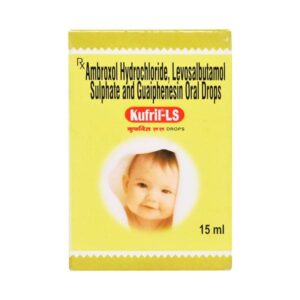GUAIPHENESIN + TERBULATINE
Guaiphenesin: Guaifenesin is a medication commonly used as an expectorant. It is used to relieve coughs and loosen mucus in the respiratory tract to make coughs more productive. Guaifenesin is available over-the-counter and also as a prescription medication.
The mechanism of action of guaifenesin is not entirely understood. It is thought to work by increasing the volume and reducing the viscosity (thickness) of respiratory tract secretions, making them easier to cough up and expel.
The usual recommended dose of guaifenesin for adults and children over 12 years old is 200-400 mg every 4 hours, not exceeding 2.4 grams in 24 hours. For children aged 6-12 years, the dose is 100-200 mg every 4 hours, not exceeding 1.2 grams in 24 hours. It is important to follow the instructions provided by a healthcare professional or on the product label.
Guaifenesin is generally considered safe and well-tolerated. However, like any medication, it can have side effects. Common side effects may include nausea, vomiting, stomach upset, headache, dizziness, and rash. Serious side effects are rare but can include allergic reactions, such as difficulty breathing, hives, or swelling of the face, lips, tongue, or throat. In such cases, immediate medical attention should be sought.
It is important to note that guaifenesin may interact with other medications, so it is advisable to consult a healthcare professional or pharmacist before taking it if you are already on any other medications. It is also not recommended for use in children under 6 years of age unless specifically directed by a doctor.
Terbulatine: Terbutaline is a medication commonly known by the brand names Terbutaline sulfate, Brethine, and Bricanyl. It is primarily used for treating various respiratory conditions such as asthma, chronic obstructive pulmonary disease (COPD), and bronchospasms associated with other respiratory disorders.
Terbutaline belongs to a class of drugs called beta-2 adrenergic agonists. It works by stimulating the beta-2 adrenergic receptors in the smooth muscles of the airways, leading to relaxation and dilation of the bronchial passages. This helps to relieve the symptoms of wheezing, shortness of breath, and coughing, making it easier for individuals to breathe.
The dosage of terbutaline may vary depending on the condition being treated and the individual patient’s response. It is available in various forms, including tablets, syrup, and solution for inhalation. The usual recommended oral dose for adults is 2.5 to 5 mg taken three times a day. For inhalation, the typical dose is 0.5 mg via a nebulizer or inhaler, repeated every 4 to 6 hours as needed.
As with any medication, terbutaline can cause side effects. Some common side effects include:
1. Nervousness/anxiety
2. Tremor (shaking)
3. Headache
4. Dizziness
5. Palpitations (racing or irregular heartbeat)
6. Increased blood pressure
7. Muscle cramps
These side effects are generally mild and transient, but if they persist or worsen, it is important to consult a healthcare professional.
It is essential to note that terbutaline should not be used as a rescue medication for acute asthma attacks or severe breathing difficulties. Instead, it is recommended for long-term management and prevention of respiratory symptoms. Always follow the prescribed dose and consult a healthcare professional for personalized advice and guidance.

